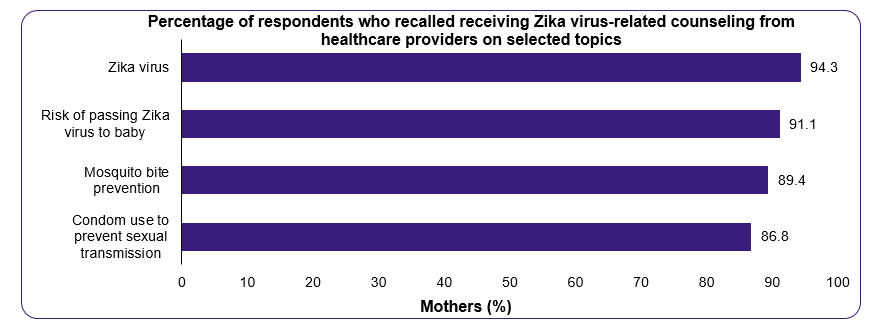Preventing Zika Virus in Puerto Rico: The Provider Role
Background
Zika virus is a major risk factor for microcephaly and other severe birth defects in babies born to women infected with Zika during pregnancy.1 Women living in Puerto Rico are at risk of Zika virus exposure due to local mosquito-borne transmission of Zika virus.1,2 Healthcare providers play an important role in Zika virus prevention by counseling patients on ways to minimize their risk of Zika virus exposure.3 Beginning in 2016, healthcare providers in Puerto Rico were under administrative orders to provide counseling on Zika virus risk-reduction strategies, assess patients for possible Zika virus exposure during prenatal care visits, and conduct prenatal testing for Zika virus.3, 4
PRAMS—Zika Postpartum Emergency Response Survey (PRAMS-ZPER)
The Puerto Rico Department of Health (PRDH) and the Centers for Disease Control and Prevention (CDC) worked together to conduct a population-based survey of women who gave birth to a live infant from August to December 2016. The Pregnancy Risk Assessment Monitoring System—Zika Postpartum Emergency Response (PRAMS-ZPER) survey* asked mothers about their use of recommended measures to prevent Zika virus infection and their interactions with healthcare providers during their pregnancy.
CDC Zika Recommendations for Healthcare Providers Caring for Pregnant Women3, 5-6
| Counsel patients on preventive measures | Prevent Zika from mosquito bites during pregnancy:
Prevent sexual transmission of Zika virus during pregnancy:
OR
|
|---|---|
| Test for Zika virus during pregnancy |
|
Interactions with Healthcare Providers
Most PRAMS-ZPER survey respondents received prenatal care in the 1st trimester (91%), and nearly three quarters (71%) considered their health care provider to be the best source of information on Zika virus.


Public Health Action
- Based on respondent report, healthcare providers are adhering to recommendations to counsel pregnant women about Zika virus infection, with more than 94% reporting a healthcare worker talked with them about Zika virus.
- Efforts to increase implementation of the Zika virus testing guidelines for pregnant women may be needed given that >20% of survey respondents reported not receiving testing for Zika virus infection in their 1st or 2nd trimester.
Resources:
*PRAMS-ZPER Results: https://www.cdc.gov/mmwr/volumes/66/wr/mm6622a2.htm?s_cid=mm6622a2_e
Questions about Zika virus: https://www.cdc.gov/zika/about/questions.html
Testing for Zika virus: https://www.cdc.gov/zika/hc-providers/testing-for-zikavirus.html
Clinical Guidance for Pregnant Women: https://www.cdc.gov/pregnancy/zika/testing-follow-up/pregnant-woman.html
References:
- Zika: Transmission & Risks: https://www.cdc.gov/zika/prevention/index.html
- Maps of laboratory-confirmed symptomatic Zika virus disease cases by State and Territory: https://www.cdc.gov/zika/reporting/index.html
- Zika Virus: For Healthcare Providers: https://www.cdc.gov/zika/hc-providers/index.html
- Puerto Rico Administrative Orders: http://www.salud.gov.pr/
- Prolonged IgM Antibody Response in People Infected with Zika Virus: Implications for Interpreting Serologic Testing Results for Pregnant Women: https://emergency.cdc.gov/han/han00402.asp
- Update: Interim Guidance for Health Care Providers Caring for Pregnant Women with Possible Zika Virus Exposure – United States (Including U.S. Territories), July 2017: https://www.cdc.gov/mmwr/volumes/66/wr/mm6629e1.htm?s_cid=mm6629e1_w
For more information on PRAMS go to: https://www.cdc.gov/prams/